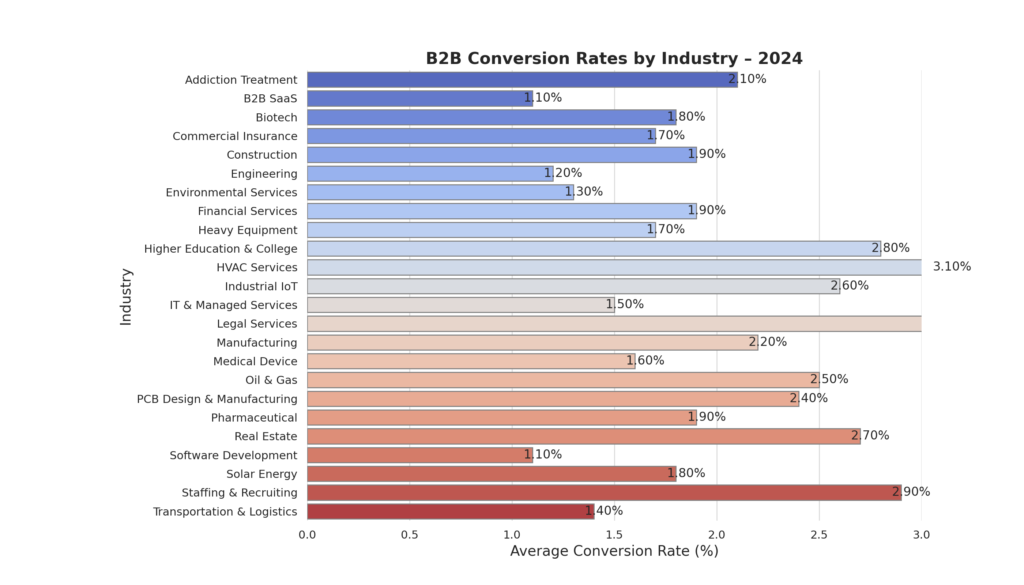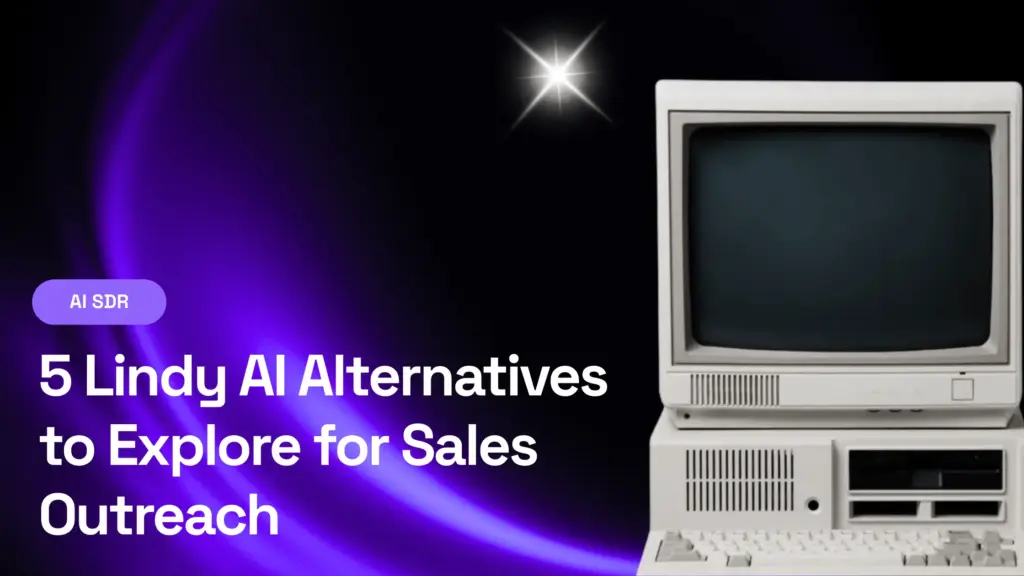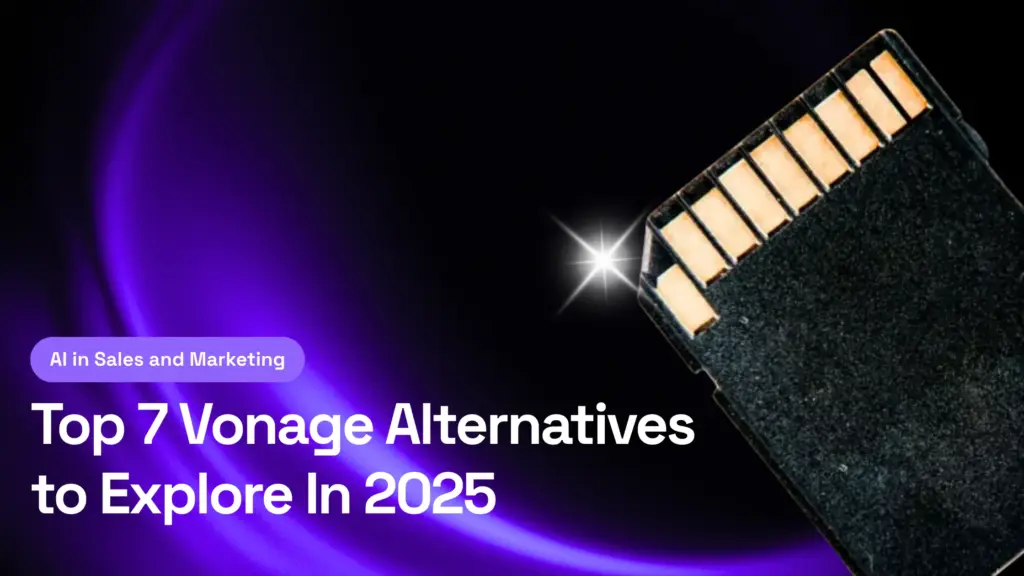Have you ever wondered why some firms appear to effortlessly convert prospects into loyal customers while others struggle to make even a dent in their sales figures? In the competitive world of B2B marketing, knowing and optimizing conversion rates can make the difference between thriving success and sluggish growth. Conversion rates, or the percentage of prospects who become customers, are the foundation of any effective B2B strategy.
In today’s digital landscape, artificial intelligence (AI) is changing the way firms approach these rates. With the appropriate AI tools, businesses may not only contact more potential customers, but also engage them in more meaningful ways, increasing their chances of conversion. In fact, recent research indicates that organizations that use AI in their sales processes have seen conversion rates increase by up to 30%.
So, how does AI transform these crucial KPIs, and what can your organization do to capitalize on its potential? Let’s take a look at B2B conversion rates and how artificial intelligence is ushering in a new era of efficiency and efficacy in corporate operations.
Understanding B2B Lead Conversion
B2B lead conversion is a critical process where potential leads are transformed into paying customers. This transformation is not just a transaction; it’s about creating lasting business relationships. In the realm of B2B, a lead conversion signifies the culmination of efforts where a potential business lead agrees to a contract or makes a purchase, marking a significant commitment compared to typical consumer (B2C) interactions.
Differences Between B2C and B2B Conversion Processes
Differences in B2C and B2B Conversion Processes
- Decision-making Time. B2B choices usually take longer since they involve more stakeholders and higher financial commitments.
- Emotional vs. Rational Purchasing. B2C purchases are frequently motivated by emotional triggers and immediate gratification, but B2B purchases are based on rational decision-making that considers long-term benefits and ROI.
- Relationships and Personalization. B2B sales rely significantly on developing connections and tailoring communication to unique business requirements and industry problems.
- Complexity of Transactions. B2B transactions are typically more complex, involving contracts, large orders, and even long-term service agreements.
The B2B Conversion Funnel Explained

Navigating the B2B conversion funnel successfully is critical for converting prospective leads into loyal clients. Each stage of the funnel reflects an important phase in a prospect’s journey, from first awareness to ultimate action. Here’s an in-depth look at each stage of the B2B funnel, as well as the necessity of nurturing leads throughout the process.
Detailed breakdown of each stage
✅ Awareness
This is the first place of encounter or discovery. Potential clients learn about your company through a variety of methods, including content marketing, social media, commercials, and attending events. The idea here is to pique their attention and encourage them to seek additional information.
✅ Interest
Prospects express interest in your content after becoming aware of them. This could include subscribing to a newsletter, downloading whitepapers, or devoting significant time to your website. Effective content marketing is essential at this level to educate and engage the prospect successfully.
✅ Consideration
At this stage, prospects are actively examining your product or service as a potential answer to their problems. They may participate in activities such as viewing product demonstrations, reading case studies, or seeking comprehensive specifications. This is a vital stage in which tailored communication and targeted content can help address unique client requirements and concerns.
✅ Intent
Intent is demonstrated when prospects take activities indicating that they are about to make a purchase decision, such as obtaining a quote, debating pricing, or asking thorough questions regarding implementation. Sales teams should be heavily active at this stage, giving targeted information and reassurances to move the prospect toward a purchase.
✅ Evaluation
Often overlapping with intent, the assessment stage involves decision-makers comparing your product’s value and ROI to competitors. Negotiations, pilot programs, and final pitches take place here. The sales and marketing team must provide thorough support and a distinct advantage over competition.
✅ Purchase
The final choice has been made, and the transaction is completed. However, the relationship does not cease here. This stage should also include post-purchase assistance and customer relationship management to ensure client satisfaction and encourage future purchases.
Importance of Nurturing Leads Through the Funnel
There are numerous reasons why it is critical to nurture leads through each level of the B2B conversion funnel. For starters, regular and meaningful participation contributes to the development of trust and professional reputation, both of which are critical components of B2B transactions. This regular contact not only builds trust, but it also helps to identify high-quality prospects who are more likely to convert into sales, improving lead qualifying.
Furthermore, targeted interactions and information enhance the customer experience by making prospects feel valued and understood. This not only makes a good impression, but it also stimulates more participation. Furthermore, good lead nurturing streamlines the sales process by ensuring that only well-qualified leads advance through each level of the funnel, so enhancing overall efficiency.
Finally, consistent lead nurturing raises the possibility of migrating leads from one stage to the next, resulting in higher total conversion rates. This holistic strategy to lead nurturing not only improves conversion rates, but it also builds a stronger, more reliable pipeline for future sales.
Average B2B Conversion Rates by Industry
Understanding the average conversion rates in B2B sales across various industries can help organizations evaluate their own performance. These rates can vary greatly by industry, reflecting the distinct challenges and client behaviors encountered in each field.
Overview of Typical Conversion Rates Across Different Industries
- Legal Services have the highest conversion rates at 7.4%.
- HVAC Services and Staffing & Recruiting industries also show strong conversion rates at 3.1% and 2.9%, respectively.
- Technology sectors like Industrial IoT and Oil & Gas report conversion rates around 2.6%.
- More traditional sectors like Manufacturing and Financial Services have rates at 2.2% and 1.9%.
- Software Development and B2B SaaS are at the lower end with 1.1% conversion rates.
Here is a more detailed table.

Factors Influencing Conversion Rates in B2B versus B2C Sectors
Factors Affecting Conversion Rates in the B2B and B2C Sectors
- Decision-Making Complexity. B2B transactions generally involve many decision-makers, extending the sales cycle and complicating the conversion process. In contrast, B2C purchases are typically impulsive and made by individual consumers.
- Transaction Value and Size. When compared to B2C sales, B2B transactions are frequently more valuable. The financial stakes are larger, and the repercussions of a purchasing choice are more serious, influencing conversion rates as firms wait longer to commit.
- Relationships and Trust. Building trust is especially important in B2B sales, where relationships and dependability play an important part in conversions. B2C marketplaces, while still based on trust, frequently prioritise ease and cost.
- Instructional Content. B2B buyers often demand more specific information and confidence before making a purchase choice, necessitating in-depth content and instructional resources, which can have an impact on conversion rate.
- Personalization. Due to the various demands of businesses, B2B transactions necessitate a greater level of customisation than B2C purchases. Tailoring solutions to individual business demands is critical and can affect conversion efficacy.
Top 8 Strategies to Optimize the B2B Conversion Funnel
1. Improve Lead Qualification with Predictive Scoring
Predictive scoring uses artificial intelligence to evaluate lead data and anticipate conversion rates, allowing sales teams to focus on the most promising leads.
For example, a corporation may use historical interactions and engagement levels to provide scores to new leads. According to statistics, organizations utilizing AI-driven predictive scoring can increase lead conversion rates by up to 15%.
This strategy not only efficiently prioritizes leads, but it also optimizes the deployment of sales resources.
Relted – B2B Lead Scoring & Qualifying Process Ultimate Guide
2. Personalize Communication
Personalizing communication based on individual consumer data and previous interactions has the potential to greatly enhance engagement and conversion rates.
For example, providing personalized email content that highlights characteristics of particular interest to the recipient might make the communication feel more relevant and engaging. Studies show that tailored emails can increase click-through rates by 14% and conversion rates by 10%.
3. Create targeted content
Creating content that targets your audience’s individual requirements and pain points at various stages of the sales funnel is critical. For example, an IT solutions provider may develop extensive guides on how to select the best sort of software for different business sizes. Content that properly answers customer problems can boost conversion rates by up to 20% by helping leads go smoothly through the sales funnel.
4. Use retargeting techniques
Retargeting is aiming for leads showing interest but not quite converting. Retargeting these visitors with online adverts helps you to raise the likelihood of turning them into consumers.
Targeted adverts for a product, for instance, might show up on other websites a potential customer visits even though they leave without making a purchase on a product page. Retargeting maintains your brand top-of- mind and motivates a revisit, hence improving conversion rates by 5–10%.
5. Automation helps you to simplify the sales process
Routine sales chores automation helps to lower risk of human error and hasten the sales process. Automating lead capture and early follow-up emails, for instance, guarantees that none of a lead is overlooked and enhances efficiency. In six to nine months, automation in lead management can result in a ten percent revenue growth.
Related – Automate Lead Generation with AI Tools in 3 Easy Steps
6. Improve landing pages
Conversion rates can be much changed by optimizing landing pages to enhance clarity and call-to- action visibility. A/B testing several designs and messaging, for instance, helps one find which components work best. By lowering friction and improving user experience, optimizing landing pages can result in 30% or more increase in conversion rates.
7. Apply robust CTAs
Clear, strong calls to action (CTAs) direct consumers into the next phase of the conversion process. Changing a CTA from “learn more” to “get started for free” for example greatly raises the possibility of a conversion. Businesses which maximize their CTAs will experience a rise in sales by more than 20%, since good CTAs lower uncertainty and define the course of action to be taken.
8. Use Social Proof
Case studies and testimonies are two examples of social proof that will help prospective clients believe your good or service to be credible and effective. Showing consumer success stories on your website and sales materials, for instance, can help to establish credibility and impact buying choices. By helping to reduce uncertainty and boost confidence in your products, including social proof has been demonstrated to raise conversion rates by up to 15%.
Benefits of Optimizing the B2B Lead Funnel

Enhanced ROI and Conversion Rates
Direct optimization of the B2B lead funnel immediately increases conversion rates, therefore improving the return on investment (ROI). Through better funnel optimization, companies may more successfully turn prospects into paying customers, so assuring that sales and marketing initiatives produce more profits.
Improved Lead Management Effectiveness
By means of optimization, simplifying the lead management process helps to minimize resource consumption and time waste. Effective lead management enables leads to be rapidly found, categorized, and developed, therefore freeing sales teams to concentrate on the most exciting opportunities.
Enhanced Client Engagement and Experience
A well-optimized lead funnel guarantees quick, relevant, and customized interactions, hence improving the whole customer experience. Building trust and loyalty—two fundamental traits of long-term commercial relationships— depends on this degree of involvement.
Decision-Making Driven by Data
By means of optimal lead funnel optimization, companies can gain important understanding of consumer preferences and habits, therefore guiding their actions based on facts instead of presumptions. This method lets plans and tactics be constantly improved by means of alignment with the real demands and wishes of the target audience.
The Impact of AI on B2B Conversion Rates
Shifting Conventional Conversion Techniques
By improving conventional conversion techniques, artificial intelligence technologies have profoundly changed the terrain of B2B sales. Deeper study of consumer data made possible by artificial intelligence helps to more precisely forecast buying behavior and spot sales prospects. For instance, artificial intelligence can examine enormous volumes of data from several points of view to identify the best times for interaction, therefore guaranteeing that contacts are relevant and timely. By providing scaled-down tailored experiences, this not only improves sales process efficiency but also greatly raises conversion rates.
Specific AI tools and their uses in the funnel
- Using a sophisticated collection of variables including engagement level, demographic information, and historical behavior, Lead Scoring Models driven by artificial intelligence analyze leads based on their probability to convert. This enables sales teams to give their efforts toward the most interesting leads top priority.
- Virtual Assistants and Chatbots. These instruments can interact with possible consumers in real-time, answering questions right away and compiling first data. This keeps interest and guides leads more effectively down the funnel.
- Predictive analytics. Based on past data, this technology forecasts consumer habits using artificial intelligence. It can forecast which leads are most likely to convert, thereby enabling businesses to customize their marketing plans to drive these leads towards a sale.
- Content Personalizing Engines. Based on past brand encounters, these AI systems provide highly focused material to possible consumers. Showing pertinent content at the appropriate moments helps companies to make their marketing materials more relevant and effective, therefore raising the possibility of conversion.
Including artificial intelligence into the B2B conversion funnel not only simplifies and automates tasks but also offers insights before unachievable with more conventional approaches. Smarter decisions, more successful marketing plans, and finally better conversion rates follow from this.
Using AnyBiz to Automate the Lead Conversion Funnel
Driven by artificial intelligence, AnyBiz transforms company approaches to B2B lead creation and management. Fundamentally, AnyBiz uses cutting-edge artificial intelligence sales agents to automate and maximize sales and marketing chores usually carried out by Sales Development Representatives (SDRs).
To enhance interaction with prospects, these artificial intelligence agents can decide on the channels of contact, topic, and time based on knowledge about They run throughout several time zones and 24/7 to make sure companies may keep continuous and efficient communication with possible customers.
How AnyBiz Automates and Optimizes the Lead Conversion Funnel for Outbound Marketing

AnyBiz streamlines the entire lead conversion process, particularly for outbound marketing. It starts by identifying potential leads using sophisticated algorithms that scan for indicators of interest or need in your offerings. Once identified, AnyBiz’s AI agents engage these leads through personalized multi-channel outreach—including emails, social media, and personalized landing pages—tailored specifically to the interests and needs of each lead.
The platform’s capabilities also include automated email classification and response, which helps manage and respond to client communications efficiently. This ensures that no potential lead is left unattended and that the interaction remains consistent and personalized, increasing the chances of moving leads down the sales funnel to a conversion.
AnyBiz’s advantages in simplifying conversion processes and lead management

Using AnyBiz mostly helps with its capacity to greatly improve the effectiveness of lead management and conversion systems. AnyBiz lessens the need for human intervention by automating repetitive operations, therefore lowering expenses and the possibility of human mistake. The AI agents handle organizing meetings and follow-up on leads, therefore automating these tasks and guaranteeing high involvement without further use of resources.
Moreover, the incorporation of artificial intelligence enables real-time data analysis, which AnyBiz applies to always hone and enhance its outreach plans. By concentrating on leads most likely to convert, this not only guarantees that the marketing efforts are more focused and effective but also increases the general ROI. AnyBiz’s tailored strategy helps to establish closer bonds with prospects, hence improving client loyalty and happiness.
All things considered, AnyBiz offers a complete solution that not only streamlines the lead management process but also improves the efficacy of B2B marketing campaigns, therefore increasing the conversion rates and enabling companies to reach scalable development.
Experience the power of automation and see how AnyBiz can transform your lead management process. Sign up now to enjoy a 7-day free trial and start maximizing your business’s potential today! No strings attached, just results. Start your free trial now!
Conclusion
In essence, by improving the accuracy and efficiency of the lead conversion process, including artificial intelligence into B2B conversion plans is a major benefit. Using AI solutions can help companies not only simplify processes but also provide more tailored, interesting experiences for prospects, hence enhancing conversion rates and general corporate development.
Adopting artificial intelligence technology in business-to—business environments is not only about following digital changes but also about aggressively using these developments to acquire a competitive edge. The companies that will flourish as the digital terrain changes are those that use artificial intelligence to more successfully grasp and satisfy consumer wants.
📜 Related articles:
- Genious 5 Outbound Marketing Examples with AI [+Proven]
- Optimize B2B Lead Management Process: Tips & AI Tools
- How to Find B2B Leads: Every Possible Way w/AI (Free + Paid)




